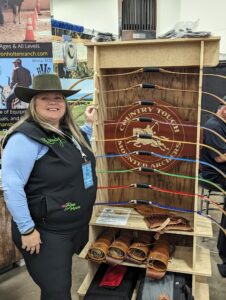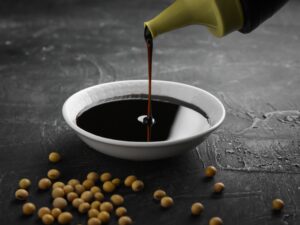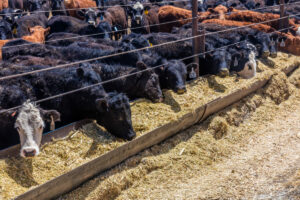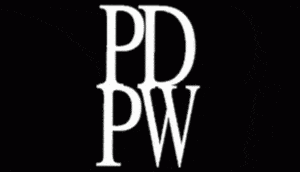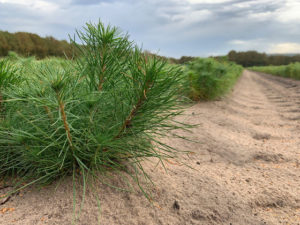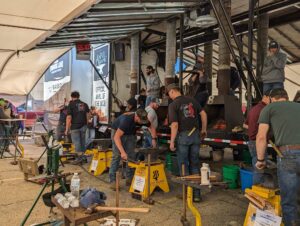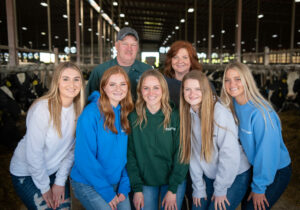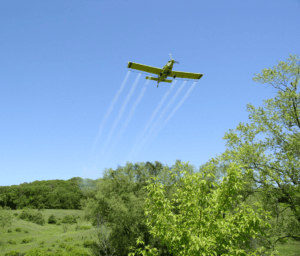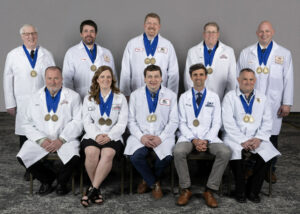Unleashing Arrows from Horseback
In the world of sports, there are those who seek the thrill of competition. Those who push the boundaries and redefine what it means to excel. For Brandy Von Holten, a former competitive martial artist with dreams of Olympic glory, the journey took an unexpected turn towards the art of mounted archery.
“Mounted archery found me,” she remarks, reflecting on the moment she first tried her hand at shooting from her mule and scored a bullseye. Unwilling to participate in sports with subjective judging, she was drawn to the exhilarating challenge of mounted archery.
Hailing from South Texas and later settling in Missouri, Von Holten’s diverse background and tenacious spirit equipped her for this new endeavor.
“Mounted archery is for the crazy people looking for something different,” she explains. “It’s about putting your reins down, running, and shooting.” From ground-based competitions to specialty shots, mounted archery offers a range of challenges for enthusiasts.
Getting started in mounted archery requires the right equipment and mindset. Van Holten emphasizes the importance of investing in quality gear and seeking proper training. Her own struggles led her to create resources for beginners, including manuals and online classes available on her website.
Navigating the intricacies of mounted archery involves mastering both horseback maneuvering and shooting techniques. Despite the sport’s challenges, Van Holten finds joy in its unconventional nature.
Despite misconceptions about age and difficulty, she believes mounted archery offers boundless opportunities for newcomers. “The best mounted archers are 50 and 60 years old,” she notes, challenging stereotypes and welcoming all to embrace their inner “weirdo” and join the adventure.
Kikkoman Expands In Wisconsin
The Wisconsin Economic Development Corp. is awarding up to $15.5 million in tax credits to assist Kikkoman Foods Inc. in expanding.
The company plans to invest at least $800 million in expanding its brewing plant in Walworth. It will build a new facility in Jefferson. WEDC expects the project to create 83 new high-paying jobs over 12 years.
Kikkoman has played a vital role in the Wisconsin economy for more than half a century. In 1973, Kikkoman Foods Inc. opened in Walworth. The company transformed the area into what has now become the Kikkoman Group’s highest-producing soy sauce facility in the world.
The plant made history as one of the first production facilities built in the United States by a Japanese company. Since then, Kikkoman has forged partnerships within the local community and contributed more than $17 million to charitable causes.
In 1998, Kikkoman opened a second production facility in Folsom, California. The company spent the last several years conducting a nationwide search for the ideal location for a third manufacturing facility. It ultimately selected a 100-acre site in Jefferson, Wisconsin.
“We have always valued Walworth for its great market access, outstanding workforce, central location for raw materials, pure water, and the open-hearted spirit of partnership of the local community,” said Mr. Yuzaburo Mogi, honorary CEO and chairman of the board of Kikkoman Corp. “We chose Jefferson for those same reasons.”
The groundbreaking for the initial phase of the Jefferson build-out will take place in June 2024. The first shipments of soy sauce are planned for fall 2026. The Jefferson site will be a 240,000-square-foot facility that will produce soy sauce and soy sauce–related seasonings, including teriyaki sauce. The next-generation production plant will combine flexibility with production efficiency and scalability. The facility will aim to reduce CO2 emissions by installing energy-efficient equipment and proactively using renewable energy.
“Kikkoman’s decision to invest in Jefferson underscores the strength and appeal of our local food and beverage niche,” said Jefferson Mayor Dale Oppermann. “We appreciate the trust Kikkoman has placed in our community and look forward to a long, prosperous partnership.”
Tightened Fed Cattle Supplies Ahead
Cattle
The USDA released its April Cattle on Feed Report last Friday and the numbers were outside of pre-report estimates. The total number of cattle on feed in feedlots with a capacity of 1,000 head or more totaled 11.8 million head on April 1, making it 1.5% higher than a year ago. While the total is higher than this time last year, it is less than pre-report estimates. March placements were 12.3% lower compared to March 2023, and again this was below average trade guesses.
Fed Cattle marketed was also lower than expected, coming in at 14% below last year. The number of heifers and heifer calves in feedlots accounted for 4.56 million head (38.5%) of the on-feed total, which is 1% higher than last year but lower than last quarter’s average.
The report paints a picture of tightening fed cattle supplies in the months ahead. Fed cattle prices were $1 lower last week, with wholesale prices also lower. The Choice beef cutout averaged $297.44, making it $2.83 lower on the week. The weekly harvest estimate of 620,000 head was 17,000 more than the previous week and 5,000 below a year ago.
Cattle Prices
Fed cattle were steady to $1.00 lower. High Choice and Prime beef breed steers and heifers brought $173 to $179/cwt, with a few instances of packages bringing $179 to $185/cwt and some bringing $186 to $189/cwt. Choice steers and heifers ranged from $163 to $173/cwt, with mixed grading and those likely to grade Select bringing $150 to $163/cwt. Holstein steers were mostly steady. High grading steers brought $156 to $166/cwt, with reports of some from $166 to $170/cwt and a few higher. Lower grading steers brought $127 to $156. Silage fed, under finished, or heavy dairy breed steers brought $75 to $125/cwt. Dairy x Beef steers were lower, bringing $128 to $173/cwt, with some higher.
Cows were mixed but mostly lower. The bulk of the cows brought $90 to $115/cwt with some to the upper $120s. Doubtful health and thin cows were bringing $89/cwt and down.
Dairy breed bull calves were steady. Most brought $200 to $400/head with some heavier, well-managed calves selling to $600. Beef and Beef Cross calves were steady, selling to $900/head with a few higher.
Networking and Training for Agriculture Interns
Internships have become a critical part of building skills and preparing students for the workforce. A one-day program presented by the Professional Dairy Producers® (PDP) will give agriculture interns the tools they need to set themselves apart and also excel after college.
PDP Accelerate is set for July 24, 2024, in Madison, Wisconsin. It will include a full day of interactive, hands-on programming to enhance a summer internship program.
Wisconsin Pork Association Program and Marketing Director Morgan Worek oversaw their 2023 summer intern, who attended the inaugural Accelerate program. “We wanted her to be able to take advantage of not only networking with other people around her age in the agriculture field but also so she could have access to resources to help her be more hirable and prepare her for the leadership roles she’ll have one day in her full-time job.”
PDP Accelerate will be facilitated by Michael Hoffman, founder and owner of Igniting Performance Inc. Hoffman will combine hands-on learning and also peer networking to ensure interns build the skills they need to excel.
Interns will emerge from PDP Accelerate armed with the ability to initiate meaningful conversations. They will also be able to leverage technology effectively, exude confident body language, and navigate diverse team dynamics. They will be ready to solicit and implement constructive feedback, and also expand their professional networks. All of which are essential attributes for success in the modern workforce.
“As a smaller organization, we don’t necessarily have the ability to provide our interns with every professional development resource on our own. This program fit the bill perfectly,” said Worek. “Accelerate is really beneficial because you’re able to utilize outside resources and not have to reinvent the wheel. You’re able to connect interns with other young people and professionals in our industry. It’s a comprehensive program that effectively prepares your interns for that next level. It prepares them for being a future employee in our industry.”
Learn more about PDP Accelerate and register interns by visiting www.pdpw.org or calling 800-947-7379.
Wisconsin Home To 17M Acres Of Forests
Arbor Day is an annual observance promoting tree planting and care. Wisconsin has celebrated Arbor Day on the last Friday of April since 1883.
The 17 million acres of forests covering nearly half of Wisconsin and the millions of urban trees across the state safeguard water resources, provide wildlife habitat, and support our forest industry while providing outdoor recreation opportunities and supporting human health.
Urban forests, which include trees in urban parks, landscaped boulevards, greenways, yard trees, and street trees, also have their own unique benefits.
“Urban forests filter air and water, control stormwater, conserve energy, and provide shade, cooling our communities by up to 10 degrees and helping prevent heat-related deaths,” says DNR Urban Forestry leader Jeff Roe. “They also add beauty to our urban environments, reduce noise, and provide nearby places to recreate.”
Urban trees also increase property values and create inviting business districts for residents and visitors.
Watch step-by-step instructions on how to plant a balled and burlapped tree: https://www.youtube.com/watch?v=ZijTjoDQid8
Watch step-by-step instructions on how to plant a tree from a container: https://www.youtube.com/watch?v=FC3uEZALMwY
Once you’re done planting the tree, don’t forget to add it to the Wisconsin Tree Planting Map: https://wi-dnr.maps.arcgis.com/apps/webappviewer/index.html?id=8204b04e47914f6a841989435e088b6c
Blacksmiths and Farriers Forge Ahead
Shoes are fashionable, whether they’re for humans or horses. And There was a time when every community had a blacksmith, and their work was focused on utility. Today’s blacksmith’s still focus on utility and function, but there’s also a certain art to what they do. Farriers, the modern-day equivalent of historical blacksmiths, now focus primarily on the craft of horseshoeing. This transition from the all-encompassing role of the blacksmith to the specialized expertise of the farrier marks a significant shift in the industry.
Craig Trnka, a seasoned veteran with 40 years of experience in horse shoeing, sheds light on the evolution of blacksmithing.
“The blacksmith was all-encompassing with agriculture, making plows and various tools essential for farming,” says Trnka. “But with the Industrial Revolution as well as the decline of horses as primary transportation, farriering emerged as a specialized art.”
In Madison, Wisconsin, blacksmiths and farriers from around the region gathered for the World Championship Blacksmiths (WCB) competition. The competition, held at the Midwest Horse Fair, drew participants from diverse backgrounds, showcasing their skills in various categories.
“The WCB competition is three days of intense challenges, testing the participants’ forging abilities and also craftsmanship,” explains Trnka. “From replicating horseshoes to demonstrating skills in forging techniques, contestants vie for the coveted title of the King or Queen of the Midwest Horse Fair.”
The competition is not merely a display of skill. It also serves as a platform for learning and growth within the blacksmithing community.
“We encourage individuals of all skill levels to participate,” says Trnka. “It’s an opportunity for new farriers and blacksmiths to learn from their peers, identify areas for improvement, and refine their craft.”
While the demographic makeup of participants varies, Trnka notes a growing presence of women in the field.
“Women make wonderful farriers, and we’re seeing an increasing number of them joining the profession,” he says. “It’s a refreshing sight to witness young individuals embracing the trade and pursuing entrepreneurship in blacksmithing.”
With each hammer strike on the anvil, they pay homage to a tradition steeped in history yet perpetually evolving.
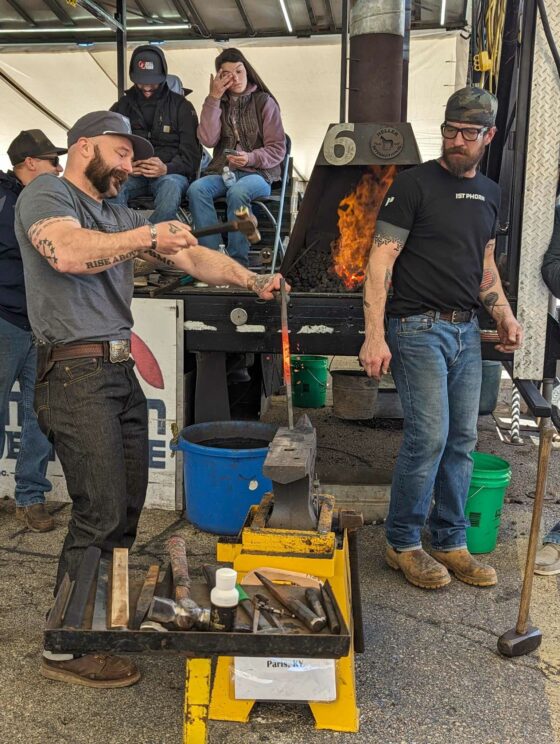
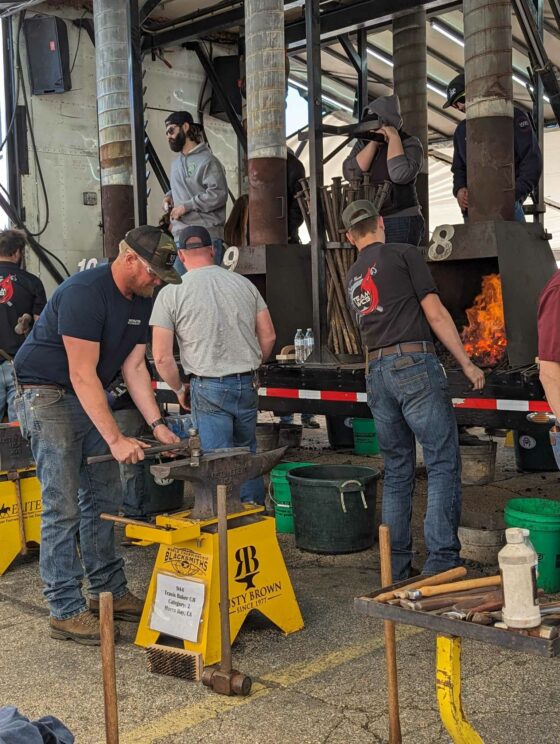
Food Is Safe Amidst New HPAI Measures
Eight states have detected the Highly Pathogenic Avian Influenza in dairy cow herds. To protect the U.S. livestock industry from the threat, USDA is taking action to get ahead of this disease and limit its spread.
The Animal and Plant Health Inspection Service announced a Federal Order requiring mandatory testing for interstate movement of dairy cattle effective Monday, April 29.
See The New Measures
- Before interstate movement, dairy cattle must receive a negative test for Influenza A virus at an approved National Animal Health Laboratory Network laboratory. There is one in Madison and surrounding states. The cost of the test is covered by APHIS. Wisconsin State Veterinarian Dr. Darlene Konkle expects turnaround times for test results to be quick.
- Owners of herds with positive dairy cattle will be required to provide epidemiological information, including animal movement tracing.
- These steps will be immediately required for lactating dairy cattle as they are at the highest risk of spreading the disease. Cows concentrate the virus in their mammary glands, Konkle explains.
- Laboratories and state veterinarians must report positive Influenza A detection diagnostic results to USDA APHIS. This isn’t new to Wisconsin, according to the Department of Agriculture, Trade and Consumer Protection.
Other animals that have contracted the virus have been detected in young goats in Minnesota housed near poultry. Wild mammals, such as foxes and raccoons – predators of wild birds – have also contracted the virus. Konkle does not expect the federal order to expand to other species. DATCP Secretary Randy Romanski says Wisconsin does not intend to put further restrictions in place.
DATCP has more information on the order: https://datcp.wi.gov/Pages/Programs_Services/AvianInfluenzaCattle.aspx
Safety Of Milk
This action has nothing to do with the safety of the milk in the supply chain, says Alan Bjerga with the National Milk Producers Federation.
“Pasteurization kills this virus. There is not a risk from the consumer population from drinking milk,” he says. “(The Federal Order) is all an effort to keep bird flu — H5N1 — from jumping from dairy cattle potentially to human beings.”
HPAI is not in Wisconsin. You can stay up to date on the virus here: https://www.aphis.usda.gov/livestock-poultry-disease/avian/avian-influenza/hpai-detections/livestock
Adam Brock, administrator of the state Division of Food and Recreational Safety, says he’s been getting phone calls about whether eggs, milk, and meat are safe to eat. He says yes! Brock also addresses the recent headline about HPAI found in grocery store milk — he reminds us that the fragments of the virus found in the milk were inactive because pasteurization kills HPAI.
“I’m not concerned about drinking milk,” he says, explaining that pasteurization is the gold standard for the safety of milk. “I would not be concerned about the milk supply.”
He’s also not concerned about cooked meat. Ground meats should be at 160°F. Poultry should be at 165°F.
Brock reminds us that practicing the basics of food safety, such as washing your hands and avoiding cross-contamination of raw and cooked food, will keep you from getting foodborne illnesses.
He says Wisconsin is unique in that it is a very “collaborative” state with advisor committees on dairy, produce, and retail foods, for example. The industry works closely together to make sure it produces safe, high-quality food. This collaboration also makes it easier for the state to get a handle on disease outbreaks, such as HPAI.
“I think Wisconsin does a great job on this,” he says. “It is unparalleled.”
Calumet County Farmers Lead In Conservation
The Woldt family in Calumet County continues to adopt new conservation efforts with the goal of inspiring others to follow suit.
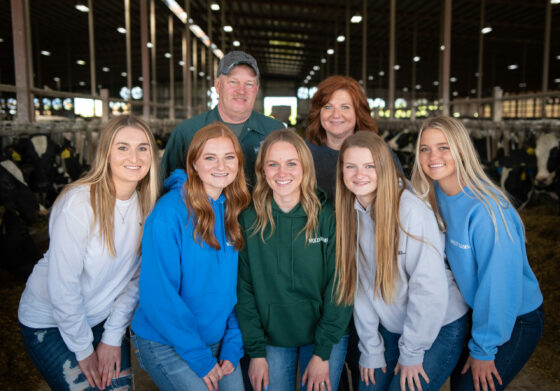
Established in 1911, Woldt Farms is a fourth-generation family farm owned and operated by Daryl Woldt, his wife, Amy, and their five daughters, Kelsey, Kayla, Kristen, Karly and Kortney. Over the years, their farm has grown from having 80 milking cows to 1,650 cows and 4,000 acres.
In recent years, they’ve adopted a variety of sustainable farming practices. Today, they use no-till and cover crops on 95% of their farm fields. They have also been planting into cover crops (otherwise known as “planting green”) for the last two years.
These practices have become an essential component of their overall farm management. The Woldts have witnessed significant environmental and financial benefits resulting from the practice changes.
“On our farm, we see a big advantage with using sustainable farming practices,” Daryl Woldt said. “It helps us reduce our input and labor costs. We like how they’re working for us.”
The Woldts joined the Calumet County Ag Stewardship Alliance to connect with other conservation-minded farmers and also stay updated on the latest research.
“It’s great to be a part of this group and be able to connect with other farmers who are using these same practices and also wanting to learn more information,” Woldt said. “Collectively, we’re always trying to improve for the benefit of the environment and for our community as a whole.”
Annual Survey Results
As part of their membership, the Woldts participated in the group’s 2023 Member Conservation Practice Survey. This highlights the collective conservation efforts among farmers in the group. It demonstrates potential environmental impacts and benefits to the local community. This is the fourth consecutive year the group has documented members’ sustainable practices.
The group, composed of 21 farmers and four community members, implemented various conservation practices including: 7,479 acres of cover crops, practicing no-till and strip-till on 9,538 acres and planting green on 3,518 acres. They also measured nutrient management impact on 18,283 acres.
The potential environmental benefits of these practices:
- Reduction of greenhouse gas emissions by 1,287 tons of carbon dioxide equivalents. This is equal to greenhouse gas emissions produced by 306 cars driven in a year.
- Prevention of sediment loss from farm fields of 21,193 tons, equivalent to 2,119 dump trucks’ worth of soil.
- Reduction of phosphorus runoff by 15,063 pounds of phosphorus. This potentially prevents 7.5 million pounds of algae growth in local water bodies.
Data was analyzed and verified by Farmers for Sustainable Food and the Wisconsin Department of Agriculture, Trade and Consumer Protection.
The Woldts recognize the annual survey results are an opportunity to inspire other farms on their path to sustainability.
“We hope to see these numbers grow in the next few years as farmers start to realize the benefits of sustainable farming,” Woldt said. “Even if they just start with a few acres, we think they would see the benefits and continue to use them on more of their farm acres.”
Individuals interested in involvement with CCASA can find more details at calumetcounty.org.
Spongy Moth Aerial Spraying to Begin in May
The Wisconsin Department of Agriculture, Trade and Consumer Protection (DATCP) plans to treat select areas in nine western Wisconsin counties for spongy moth starting in May. Residents can expect loud, low-flying planes in the affected areas as early as sunrise.
A small yellow plane will be treating for invasive spongy moth caterpillars. These non-native insects defoliate many kinds of trees and plants during their caterpillar stage. This causes tree stress and potentially tree death. In an attempt to slow their spread, treatment efforts will be focused in western Wisconsin, where spongy moth populations are limited or beginning to build.
“Spongy moth is well established in the eastern two-thirds of Wisconsin, where it reached record population levels in 2023,” says Michael Falk, Forest Pest Survey and Control Unit Supervisor. “DATCP will use effective and environmentally-sound aerial treatment methods to slow its spread into the relatively uninfested western part of the state, in order to limit its impacts in this region and areas lying further west.”
Damaging impacts of spongy moth feeding include the cost of removing dead trees and potential loss of property value. In addition, caterpillars shed their skins several times as they feed, and these bristly skins can irritate the eyes, skin, and the respiratory system in humans.
Treatments are expected to begin in Wisconsin in May and end in mid-July. Maps of treatment areas are available at https://smaerialspray.wi.gov. Spraying will begin shortly after caterpillars hatch and depends on favorable weather conditions. Planes may start applying treatments as early as 5 a.m., flying just above treetops over treatment sites, and continue until finished or as long as weather conditions remain favorable. Spraying may last into the late morning or early afternoon.
In May to early June, planes will spray Bacillus thuringiensis var. kurstaki (Btk), targeting spongy moth caterpillars. Btk is a naturally-occurring soil bacteria that kills spongy moth caterpillars feeding on treated canopy foliage. Btk is not toxic to people, bees, pets, or other animals. Some people with severe allergies may wish to stay indoors during nearby treatment applications. Btk is used in certified organic food production. The following counties are scheduled to receive Btk treatments: Barron, Buffalo, Chippewa, Crawford, Dunn, Grant, Iowa, Lafayette, and Rusk.
In late June to mid-July, planes will spray an organic, biodegradable mating disruptor containing spongy moth pheromone. Pheromone treatments target adult male moths by inhibiting their ability to locate female moths. The following counties are scheduled to receive mating disruptor: Dunn, Grant, and Lafayette.
Ten Makers Elevate to Masters
Pictured back row (from left): Tony Hook, Hook’s Cheese Company, Inc.; Michael Newman, BelGioioso® Cheese; Matt Eardley, Klondike Cheese Company; Kirk Hansen, Nasonville Dairy, Inc.; and Jason Radke, BelGioioso® Cheese. Front row: Brian Jackson, Nasonville Dairy, Inc.; Sara Griesbach, Nasonville Dairy, Inc.; Adam Buholzer, Klondike Cheese Company; Andy Hatch, Uplands Cheese Company; and Aaron Quick, Sartori® Cheese.
The Wisconsin Master Cheesemaker Program is proud to announce the graduation of its 2024 class, which consists of 10 exceptional cheesemakers, including the second-most certified Master and third-ever female Master.
Wisconsin is home to over 1,200 licensed cheesemakers who produce an astonishing array of more than 600 cheese varieties. However, for those seeking to reach the pinnacle of their craft, the Wisconsin Master Cheesemaker certification is the ultimate achievement. The program is a joint effort by the UW-Madison Center for Dairy Research and Dairy Farmers of Wisconsin. Wisconsin is the only place outside of Switzerland where a cheesemaker can achieve this level of expertise.
“This certification (and honor) is hard to come by, and it’s certainly not an easy feat,” says Chad Vincent, CEO of Dairy Farmers of Wisconsin. “Only a select few earn the prestigious title of Wisconsin Master Cheesemaker. These individuals have dedicated years to perfecting their skills, honing their craft, and expanding their knowledge of cheese production.”
Sara Griesbach, newly certified Wisconsin Master Cheesemaker at Nasonville Dairy, Inc., has become the third-ever woman to complete the prestigious Wisconsin Master Cheesemaker program. Griesbach, alongside nine other graduates, earned medals at the Graduating 2024 Master Cheesemaker Class ceremony held on April 18.
Also from Nasonville Dairy, Inc. is Brian Jackson, returning for his ninth and 10th certifications. That makes him the second-most decorated cheesemaker in the program after Bruce Workman, who holds 13 certifications. This year, Jackson is earning certifications in Queso Blanco and Cheese Curds.
The 2024 graduating class welcomes five new Masters and five returning Masters for new certifications.
New Wisconsin Master Cheesemakers:
- Sara Griesbach, Nasonville Dairy, Inc., Curtiss & Marshfield
- Certified Master: Cheddar and Monterey Jack
- Andy Hatch, Uplands Cheese Company, Dodgeville
- Certified Master: Hard Surface Ripened Cheese (Pleasant Ridge Reserve)
- Michael Newman, BelGioioso® Cheese, Freedom
- Certified Master: Fresh Mozzarella
- Aaron Quick, Sartori® Cheese, Antigo
- Certified Master: Asiago and Parmesan
- Jason Radke, BelGioioso® Cheese, Freedom
- Certified Master: Fresh Mozzarella and Ricotta
Returning Wisconsin Master Cheesemakers:
- Adam Buholzer, Klondike Cheese Company, Monroe
- Certified Master: Brick and Gouda
- Matt Erdley, Klondike Cheese Company, Monroe
- Certified Master: Gouda and Havarti
- Kirk Hansen, Nasonville Dairy, Marshfield
- Certified Master: Asiago and Cheese
- Tony Hook, Hook’s Cheese Company, Inc., Mineral Point
- Certified Master: Cheddar
- Brian Jackson, Nasonville Dairy, Inc., Marshfield
- Certified Master: Cheese Curds and Queso
Once certified, these Wisconsin Master Cheesemakers join an exclusive group of individuals recognized as the best in their field. Their expertise and knowledge are highly sought after, and they play a crucial role in preserving and advancing Wisconsin’s rich cheesemaking tradition. Look for the Wisconsin Master Cheesemaker Seal to support a Master who has devoted their career to perfecting the art of cheese.

